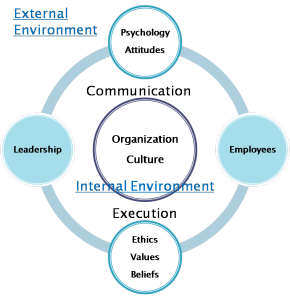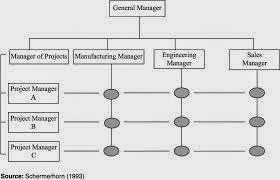ORGANIZATIONAL EFFECTIVENESS THROUGH ORGANIZATION CULUTRE
organization
culture is an important determinant of how well the organization will perform.
Every organization seeks to be more effective and achieve better results; a
careful business strategy is developed to achieve this. However, successful
execution of the strategy occurs when structure, roles, capability, leadership,
people management systems and organizational culture change are all aligned to
the strategy. So , Organizational culture is a system of shared values and
beliefs about what’s important and appropriate in an organization; it also
includes feelings and relationships internally and externally. Every
organization’s values are supposed to be unique and are widely shared and
reflected in daily practice, relevant to the company purpose and strategy.
It’s
important for organizations of different size and level to create the kind of
environment or culture where the positive managerial patterns of listening,
coaching, guiding, involving and problem-solving are actively encouraged and
reinforced. This is where the policy of the Human Resources department is
critical as it reflects and reinforces organizational values and culture.
The culture of the
workplace controls the way employees behave amongst themselves as well as with
people outside the organization.
- The
culture decides the way employees interact at their workplace. A healthy culture encourages
the employees to stay motivated and loyal towards the management.
- The
culture of the workplace also goes a long way in promoting healthy
competition at the workplace. Employees try their level best to perform better than
their fellow workers and earn recognition and appreciation of the
superiors. It is the culture of the workplace which actually motivates the
employees to perform.
- Every
organization must have set guidelines for the employees to work
accordingly. The culture of an organization represents certain
predefined policies which guide the employees and give them a sense of
direction at the workplace. Every individual is clear about his roles
and responsibilities in the organization and know how to accomplish the
tasks ahead of the deadlines.
- No
two organizations can have the same work culture. It is the culture of an
organization which makes it distinct from others. The work culture
goes a long way in creating the brand image of the organization. The
work culture gives an identity to the organization. In other words, an
organization is known by its culture.
- The
organization culture brings all the employees on a common platform. The employees must be treated
equally and no one should feel neglected or left out at the workplace. It
is essential for the employees to adjust well in the organization culture
for them to deliver their level best.
- The
work culture unites the employees who are otherwise from different back
grounds,
families and have varied attitudes and mentalities. The culture gives the
employees a sense of unity at the workplace.
Certain organizations follow a culture where all
the employees irrespective of their designations have to step into the office
on time. Such a culture encourages the employees to be punctual which
eventually benefits them in the long run. It is the culture of the organization
which makes the individuals a successful professional.
- Every
employee is clear with his roles and responsibilities and strives hard to
accomplish the tasks within the desired time frame as per the set
guidelines. Implementation of policies is never a problem in organizations
where people follow a set culture. The new employees also try their level
best to understand the work culture and make the organization a better
place to work.
- The
work culture promotes healthy relationship amongst the employees. No one treats work as a
burden and mounds himself according to the culture.
- It
is the culture of the organization which extracts the best out of each
team member.
In a culture where management is very particular about the reporting
system, the employees however busy they are would send their reports by
end of the day. No one has to force anyone to work. The culture develops a
habit in the individuals which makes them successful at the workplace.
So that , Organizational culture is
the behavior of humans who are part of an organization and the meanings that
the people react to their actions. Culture includes the organization values,
visions, norms, working language, systems, symbols, beliefs, and habits. It is
also the pattern of such collective behaviors and assumptions that are taught
to new organizational members as a way of perceiving, and even thinking and
feeling. Organizational culture affects the way people and groups interact with
each other, with clients, and with stakeholders.



Comments